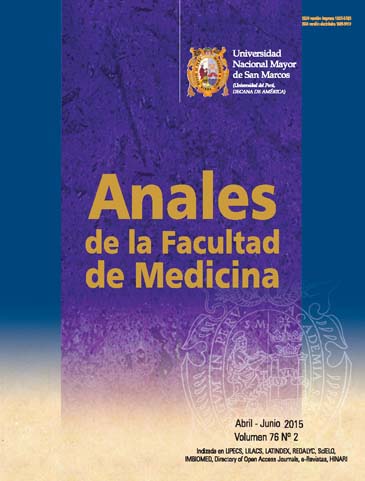Metastatic lung adenocarcinoma favorable outcome with ITK-EGFR treatment in a smoker Metastatic lung adenocarcinoma favorable evolution with ITK-EGFR treatment in a smoker.
DOI:
https://doi.org/10.15381/anales.v76i2.11148Keywords:
Lung adenocarcinoma, thyroid transcription factor-1, epidermal growth factor receptor, erlotinib.Abstract
Background: Lung cancer has highest mortality in both sexes. Current management of lung adenocarcinoma includes determining epidermal growth factor receptor (EGFR) mutational status as this is the target of erlotinib, a biologic therapy. Case report: A 62 yearold male with high smoking cancer risk presented chronic headache for a month, and magnetic resonance showed a brain tumor. Surgical specimen diagnosis was metastatic pulmonary adenocarcinoma by immunohistochemistry (TTF-1 (+)). An asymptomatic lesion in the right upper lobe of the lung was identified by tomography. Due to positivity to EGFR gene exon 21 mutation erlotinib was started; it was well tolerated by the patient. The patient died 31 months after diagnosis. Discussion: Treatment with erlotinib was initially indicated in the profile of an Asian and non-smoker woman patient. The overall survival rate with erlotinib in patients with non-small cell lung cancer is reported as 15.9 months, less time than with our patient, even considering his heavy smoker condition which should have decreased both the chance of having EGFR mutation and response to treatment.Downloads
Published
2015-06-15
Issue
Section
Casos clínicos
License
Copyright (c) 2015 Joseph Jesús Exebio Jara, Roy Nick Cabrera Sandoval, Jackeline Karol Amaro Palomino, José Carlos Revilla López

This work is licensed under a Creative Commons Attribution-NonCommercial-ShareAlike 4.0 International License.
Those authors who have publications with this magazine accept the following terms:
- Authors will retain their copyrights and guarantee the journal the right of first publication of their work, which will be simultaneously subject to Creative Commons Attribution License that allows third parties to share the work as long as its author and its first publication this magazine are indicated.
- Authors may adopt other non-exclusive licensing agreements for the distribution of the version of the published work (eg, deposit it in an institutional electronic file or publish it in a monographic volume) provided that the initial publication in this magazine is indicated.
- Authors are allowed and recommended to disseminate their work over the Internet (eg: in institutional telematic archives or on their website) before and during the submission process, which It can produce interesting exchanges and increase quotes from the published work. (See El efecto del acceso abierto ).
How to Cite
1.
Exebio Jara JJ, Cabrera Sandoval RN, Amaro Palomino JK, Revilla López JC. Metastatic lung adenocarcinoma favorable outcome with ITK-EGFR treatment in a smoker Metastatic lung adenocarcinoma favorable evolution with ITK-EGFR treatment in a smoker. An Fac med [Internet]. 2015 Jun. 15 [cited 2024 Jul. 17];76(2):199-202. Available from: https://revistasinvestigacion.unmsm.edu.pe/index.php/anales/article/view/11148















